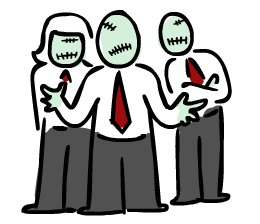I'm sitting backstage, enjoying the show. Ty Kiisel and Raechel Logan are onstage and doing an awesome job. The Keynote today, at the conference, is actually going to be the Talking Work podcast. There's a live band, several hundred people in the audience, and the stage looks like the set of The Tonight Show. I'm sitting backstage, sipping my water and listening to Donna Fitzgerald speak. I wonder to myself, what is Ty going to want to talk about? Before I answer my own question, I notice one of the people backstage approaching me, as he mouths something into his radio. He smiles at me and says, "They're about ready for you, Derek. If you would please, got ahead and get into position." I remember from the rehearsal the night before that I was to go stand on an X and wait for the lights to come on. ...and so the party begins. The entire WorkOut 2011: TalkingWork Keynote lasted about 1 hour and 26 minutes. I modified the embedded YouTube link so that it would advance to just before I came on. But, I would really recommend you go back to the beginning and watch the whole thing. Donna had some excellent talking points. I don't want to say what anyone talked about. It's so much better letting them speak for themselves, via the video. Ty and Raechel were amazing hosts and AtTask blew me away by the level of quality this event had.
The entire WorkOut 2011: TalkingWork Keynote lasted about 1 hour and 26 minutes. I modified the embedded YouTube link so that it would advance to just before I came on. But, I would really recommend you go back to the beginning and watch the whole thing. Donna had some excellent talking points. I don't want to say what anyone talked about. It's so much better letting them speak for themselves, via the video. Ty and Raechel were amazing hosts and AtTask blew me away by the level of quality this event had.
So, sit back and enjoy the show. And could someone please tell me where the hell that green feather went!? (Don't worry, you'll find out) Since this post was written, the Keynote video has been changed to "private". It looks like each of the interviews will have their own video on YouTube.
I have a quote by Seth Godin that has recently become my mantra. He wrote
Go, give a speech. Go, start a blog. Go, ship that thing that you’ve been hiding. Begin, begin, begin and then improve. Being a novice is way overrated.
Thank you again to Ty and Raechel for inviting me out to Utah, to enjoy your event and share in the wonderful conversations.
What I've heard Ty say rings true.
It doesn't matter what we do. It doesn't matter what industry we're in or even what our role is. We all share one thing in common. And that is we all work.







